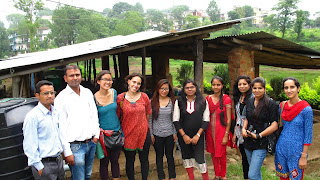Palumpur, located two hours by bus from Dharamsala is beautifully located between tea plantations. The organic farming section of the agriculture department is spread out over 38 acres. When I first arrived, the professor was explaining the various types of vermicompost we can try starting as part of our organic farming/kitchen garden projects. The speedy process takes around 6 months, with the average length of time taking 12 months, composting, I realized, is a commitment. We learned about 10 different ways to compost as well as ways to create organic and nutrient filled pesticides. A main ingredient in creating a great compost or organic pesticide is cow dung, and luckily, I don’t see India running out of it anytime soon.
 |
| Visit to the Palumpur University's Department of Agriculture |
We walked around the campus admiring the greenhouses filled with ceiling high beanstalks and tomatoes, the lush rice paddies and vegetable plantations. Awed by the vibrant color of green beanstalks, I decided then and there I wanted to plant beans in my garden in Maiti! Fortunately, we purchased two types of hybrid beans from the university that day.
Bamboo fences, benches and shelving were also another source of natural inspiration I took in at the university. There was an entire house made of bamboo complete with tables and chairs inside that the department uses occasionally for trainings. The bamboo creations were beautiful as well as sturdy. I carefully took pictures of how the bamboo fence and bench were built, so I can hopefully mimic the construction after the monsoon.
Maybe I am being overly optimistic in my venture into organic farming (as it is my second side project), but the Palumpur visit was inspiring and motivating nonetheless. And now to start planting my seeds!
Michelle Fujisaki - USA
HR Coordinator

No comments:
Post a Comment